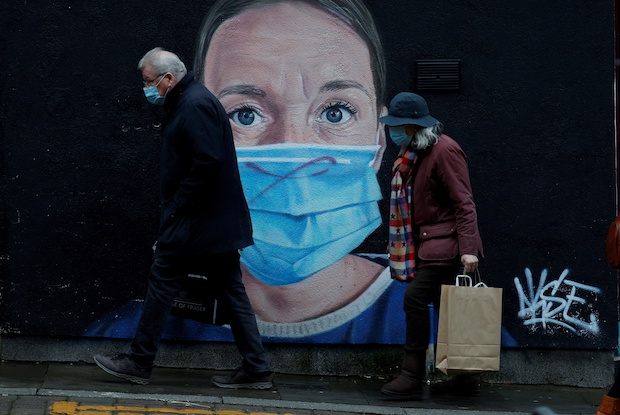
People wearing face masks walk past a mural of a nurse in the center of Manchester, Britain, Nov. 29, 2021. (REUTERS)
LONDON — England could face a wave of COVID-19 infections caused by the Omicron variant leading to as many as 75,000 deaths by the end of April if no new control measures are brought in, according to modelling research published on Saturday.
Prime Minister Boris Johnson’s government has already brought in new rules for England to slow the spread of Omicron with orders for people to work at home if possible, to wear masks in public and for entertainment venues to use vaccine passports.
On Friday, Britain reported 58,194 new cases in 24 hours, the highest daily total since January. Health officials say Omicron is now spreading in the community and there could be more than one million infections by the end of the month.
The UK Health Security Agency said that while no cases of Omicron had yet resulted in hospitalisation or death, there was insufficient data to assess the severity of Omicron.
The report by London School of Hygiene & Tropical Medicine (LSHTM), which has not been peer reviewed, suggested that under the most optimistic of forecasts there would be more than 2,000 daily hospitalisations and 24,700 deaths between Dec. 1 and April 30 if no further action is taken by the government.
Under its most pessimistic modelling, hospital admissions would be about twice as high as during January this year, with about 492,000 hospitalisations and 74,800 deaths.
“In our most optimistic scenario, the impact of Omicron in the early part of 2022 would be reduced with mild control measures such as working from home,” said Rosanna Barnard, of the school’s Centre for the Mathematical Modelling of Infectious Diseases.
“However, our most pessimistic scenario suggests that we may have to endure more stringent restrictions to ensure the NHS (National Health Service) is not overwhelmed. Mask-wearing, social distancing and booster jabs are vital, but may not be enough.”
Johnson, who is facing significant opposition from within his Conservative party over the latest restrictions, is not planning to go beyond those “Plan B” measures, his spokesman said on Friday.
The government hopes that an accelerated rollout of booster vaccine doses, which early data suggests significantly restore protection against mild disease caused by the Omicron variant, will mitigate the need for new controls.